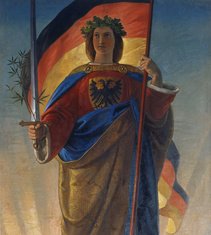|
Question or Term
|
Answer
|
|
A name given to the Frankfurt Parliament due to its high proportion of teachers, professors, lawyers, and those with degrees
|
Professor's Parliament
|
|
A revolution opposing a former one or reversing its results
|
Counter-revolution
|
|
The king of Prussia who rejected the position of Emperor offered to him by the Frankfurt Parliament in March 1849
|
Frederick William IV (1795 - 1861)
|
|
That social class which particularly resented the restrictions of the political systems in the German states due to their political exclusion, censorship, and the actions of the secret police
|
Middle Class
|
|
That body which was often feckless in achieving anything as it required the unanimous approval of its members for decisions to be passed from 1822 onwards
|
Federal Convention
|
|
That incarnation of a German state otherwise known as the First Reich
|
Holy Roman Empire
|
|
An 1859 war in which France and Sardinia defeated Austria in no small part due to a prolonged lack of military investment and reform, the latter losing much of its Italian territory
|
Second Italian War of Independence
|
|
That nation that was fearful of the rise of German nationalism due to the belief that it could serve as a catalyst to provoke more persistent nationalist demands from the empire's minorities
|
Austrian Empire
|
|
The two consecutive years in which the radical liberal Progressive Party gained successively large majorities in the Prussian lower house against a background of constitutional crisis caused by von Roon's Army Reform Bill
|
1861 and 1862
|
|
Political views commonly linked to the middle classes and broadly in favour of progress, reform, and free trade, as opposed to absolutism
|
Liberalism
|
|
|
Question or Term
|
Answer
|
|
A very centralised constitution adopted in Austria in March 1849 which allowed for a bicameral parliament and moderate reforms though still under a very powerful monarch, abolished in 1851 by Emperor Franz Joseph I in favour of autocracy
|
March Constitution
|
|
The emperor of Austria who abdicated the throne in December 1848 in favour of his nephew Franz Joseph I after uprisings, the failure of his two more liberal manifestos in appeasing protesters, and the defeat of his army in Hungary
|
Ferdinand I (1793 - 1875)
|
|
An Austrian agreement with the Catholic Church which gave the latter much greater state influence, alienating Protestants and secularists alike
|
1855 Concordat
|
|
That revolution in which the principal demands were for an elected representative government and the unification of Germany
|
March Revolution
|
|
An indecisive parliament consisting mostly of liberals - though a third of members being radicals - elected in April 1848 under the new Prussian liberal ministry, first meeting in May with the task of drawing up a new constitution, which steadily lost authority and support over the course of the year
|
Prussian National Assembly
|
|
A 19th century debate over the best path to German unification as well as the borders a united Germany should take
|
German Question
|
|
Identification with one's nation which is held central to all political activity and decision making
|
Nationalism
|
|
A large 1813 battle in which principally Russian, Austrian, Prussian, and Swedish forces defeated the French army under Napoleon, leading to the dissolution of the Confederation of the Rhine
|
Battle of Leipzig
|
|
A term used by Karl Marx to refer to the middle classes, usually capitalists, manufacturers, and employers
|
Bourgeoisie
|
|
A leading Austrian diplomat, Foreign Minister from 1809 until 1848 and Minister President from 1821 until 1848, known for his abject conservatism, and the political system he led the way in formulating in Europe after the Napoleonic Wars
|
Prince Klemens von Metternich (1773 - 1859)
|
|

